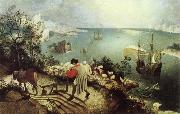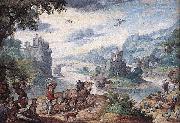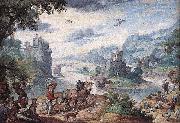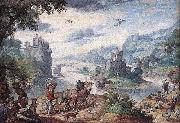
Oil On
Canvas, Real Flavor of Old Masters
|
BRUEGEL, Pieter the Elder
|
|||
|
|
|||
| Flemish Northern Renaissance Painter, ca.1525-1569 (born c. 1525, probably Breda, duchy of Brabant ?? died Sept. 5/9, 1569, Brussels) Greatest Netherlandish painter of the 16th century. Not much is known of his early life, but in 1551 he set off for Italy, where he produced his earliest signed painting, Landscape with Christ and the Apostles at the Sea of Tiberias (c. 1553). Returning to Flanders in 1555, he achieved some fame with a series of satirical, moralizing prints in the style of Hiëronymus Bosch, commissioned by an Antwerp engraver. He is best known for his paintings of Netherlandish proverbs, seasonal landscapes, and realistic views of peasant life and folklore, but he also took a novel approach to religious subject matter, portraying biblical events in panoramic scenes, often viewed from above. He had many important patrons; most of his paintings were commissioned by collectors. In addition to many drawings and engravings, about 40 authenticated paintings from his enormous output have survived. His sons, Peter Brueghel the Younger and Jan, the Elder Brueghel (both of whom restored to the name the h their father had abandoned), and later imitators carried his style into the 18th century. | |||
|
|
|||
|
|
Landscape with the Fall of Icarus new4/BRUEGEL, Pieter the Elder-856868.jpg Painting ID:: 30513 Visit European Gallery |
mk68 Oil on wood,transferred to canvas 29"x44" Brussels,Royal Museums of Fine Arts 1567-1568 | |
Height Width |
INS/CM |
||
|
X |
|
||
|
|
|||
|
Hans Bol
|
|||
|
|
|||
| (1534 - 1593), Flemish artist, received his early training from his two uncles who were also painters. He then was the apprentice to a Mechelen watercolorist and tempera painter at the age of fourteen. Because Boles watercolors became so widely reproduced, he began creating miniatures on parchment. The technique earned him many international clients and a good income. In addition, Bol also produced several oil paintings, illuminated manuscripts, drawings, and engravings. He preferred to create landscapes, mythological, allegorical and biblical scenes, and genre paintings. Bol was a mannerist, which followed the High Renaissance. One of his most famous works of art is Landscape with the Fall of Icarus, made with watercolours on paper. It was inspired by Ovid's Metamorphoses, in which the ancient myth of Icarus is told. The painting is a marvelous example of the art of landscape. Subtle colour transitions, skilful perspective and effective contrasts between foreground and background, and human figures and the forces of nature, lend this miniature painting a cosmic dimension. Bol chose the Icarus theme on several occasions. It was also subject of one of his paintings, which described in detail and highly praised by Karel van Mander in the 17th century. Although Bol was once an important and admired painter, we only know him through his small drawings and watercolours. Most of his paintings appear to have been lost. This miniature is all the more important, because it probably produces the painting referret to by Van Mander, which may have been his masterpiece. Consequently, Bol ought to be viewed not only as a superior miniature painter, but above all as an important artist who played a key role in the development of landscape art. | |||
|
|
|||
|
|
Landscape with the Fall of Icarus new23/Hans Bol-634898.jpg Painting ID:: 70628 Visit European Gallery |
133 x 206 mm 16th century | |
Height Width |
INS/CM |
||
|
X |
|
||
|
|
|||
|
Hans Bol
|
|||
|
|
|||
| (1534 - 1593), Flemish artist, received his early training from his two uncles who were also painters. He then was the apprentice to a Mechelen watercolorist and tempera painter at the age of fourteen. Because Boles watercolors became so widely reproduced, he began creating miniatures on parchment. The technique earned him many international clients and a good income. In addition, Bol also produced several oil paintings, illuminated manuscripts, drawings, and engravings. He preferred to create landscapes, mythological, allegorical and biblical scenes, and genre paintings. Bol was a mannerist, which followed the High Renaissance. One of his most famous works of art is Landscape with the Fall of Icarus, made with watercolours on paper. It was inspired by Ovid's Metamorphoses, in which the ancient myth of Icarus is told. The painting is a marvelous example of the art of landscape. Subtle colour transitions, skilful perspective and effective contrasts between foreground and background, and human figures and the forces of nature, lend this miniature painting a cosmic dimension. Bol chose the Icarus theme on several occasions. It was also subject of one of his paintings, which described in detail and highly praised by Karel van Mander in the 17th century. Although Bol was once an important and admired painter, we only know him through his small drawings and watercolours. Most of his paintings appear to have been lost. This miniature is all the more important, because it probably produces the painting referret to by Van Mander, which may have been his masterpiece. Consequently, Bol ought to be viewed not only as a superior miniature painter, but above all as an important artist who played a key role in the development of landscape art. | |||
|
|
|||
|
|
Landscape with the Fall of Icarus new24/Hans Bol-347478.jpg Painting ID:: 72555 Visit European Gallery |
16th century Watercolour on paper 133 x 206 mm cjr | |
Height Width |
INS/CM |
||
|
X |
|
||
|
|
|||
|
BOL, Hans
|
|||
|
|
|||
| Flemish Northern Renaissance Painter, 1534-1593 Hans Bol (1534?C1593), Flemish artist, received his early training from his two uncles who were also painters. He then was the apprentice to a Mechelen watercolorist and tempera painter at the age of fourteen. Because Bol??s watercolors became so widely reproduced, he began creating miniatures on parchment. The technique earned him many international clients and a good income. In addition, Bol also produced several oil paintings, illuminated manuscripts, drawings, and engravings. He preferred to create landscapes, mythological, allegorical and biblical scenes, and genre paintings. | |||
|
|
|||
|
|
Landscape with the Fall of Icarus new24/BOL, Hans-583777.jpg Painting ID:: 74317 Visit European Gallery |
Date 16th century Medium Watercolour on paper Dimensions 133 x 206 mm cyf | |
Height Width |
INS/CM |
||
|
X |
|
||
|
|
|||










